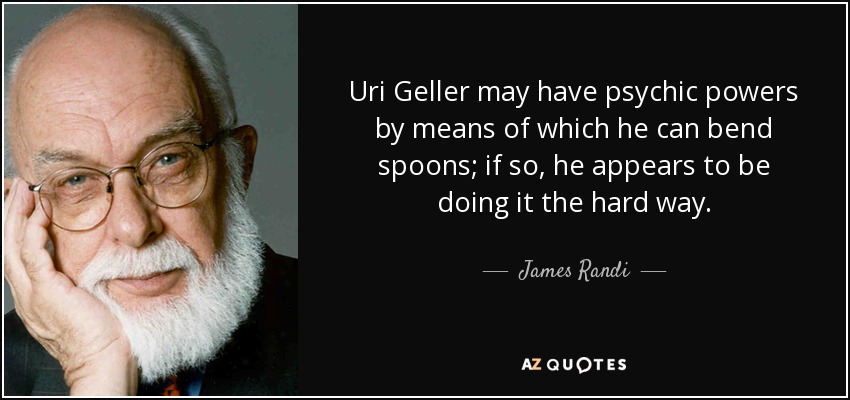
This weekend, the New York Times published a piece by David Segal with the headline, “The End of the Magic World’s 50-Year Grudge.” The sub-headline read, “In 1973, Uri Geller claimed to bend metal with his mind on live television. Skeptics couldn’t beat him. Now they’ve joined him.”
Bullshit.
If you don’t know who Uri Geller is, I’ll let you go read about him on Wikipedia. While you’re there, read about how James Randi showed up Geller on multiple occasions, including in court, where Geller’s suit against Randi cost the latter over a quarter-million dollars in legal fees to defend. But none of that went to Geller who, in the end had to pay a six-figure sum — a fact Segal left out entirely.
As he did in his book, “The Truth About Uri Geller,” here’s Randi laying out the case on what I think was a PBS special, including his role in Geller’s infamous failure on Johnny Carson’s show…
The dangerous thing hasn’t been Geller pretending he could melt metal with his mind. It’s when he extended himself into pseudoscience with products that supposedly healed serious diseases, without offering a shred of scientific evidence to back up his claims. In doing so, he fell into the same despicable category as sellers of homeopathic remedies and phony faith healers who scam vulnerable victims who believe the lies and don’t seek genuine medical aid.
Randi used to say that magicians are the honest ones, because they tell you they’re going to lie to you, then they do. Geller, on the other hand, can’t admit he’s lying or the gig is up. That’s why Geller reminds me of Trump. Both of them have been able to have long careers regardless of what their critics have said about them. When their outright untruths are revealed, they merely scoff, pivot to even more unprovable nonsense, and demonstrate that even bad publicity can be good for their bottom line.
Segal’s piece coincides with the arrival of a recent book by Ben Harris (no relation), who was once a Geller skeptic but pulled a one-eighty and became a close friend in recent years. I haven’t read Harris’ tome, but if it’s anything like what Segal has written, Geller couldn’t have asked for better publicists, because the two are fully in his corner, buying into all his ludicrous claims.
Segal fell for everything Geller threw at him, beginning with his charm. Even Geller’s harshest critics will admit that, like any successful con man, he is very good at what he does. He treats people in a friendly manner, offers encouragement, and is a master of self-promotion. How can someone so nice be doing anything dishonorable? Thus, Segal’s tone is one of idealization, as if he were writing a profile of Margot Robbie for People magazine that just so happens to coincide with the opening weekend of her “Barbie” movie.
Disinformation spreads like wildfire thanks to unchecked social media and outlets that don’t put such claims under a microscope. Even when they do, there are always plenty of people who still prefer the guy with a full head of hair, a broad smile, and assertions about abilities above and beyond the rest of us. In an era where Trump’s repetitive narcissism, bald-faced lies, and election denials have led to tens of millions of people believing what he says rather than the truth, it is disappointing but no surprise Geller can still thrive to the point where he gets treated with such kid gloves by the New York Times.
They would never admit they’ve been fooled. Neither, apparently, would David Segal.
I was proud to be a friend and supporter of James Randi, who I’ve written about often and was happy to have as a frequent guest on my radio shows. When he died in 2020, I wrote this obituary and included links to several of those appearances, including our on-air discussions about Geller.
